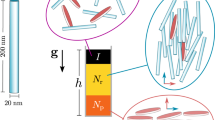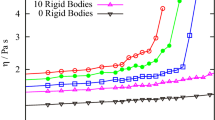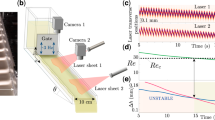Abstract
VISCOMETEBS with a cone and plate configuration are often used for viscosity measurements on non-Newtonian fluids, and for suspensions provided that a particle cone truncated near its open end is used. In the latter case it has been assumed that radial motion of particles occurs too slowly to affect the accuracy of the measurements involved.
This is a preview of subscription content, access via your institution
Access options
Subscribe to this journal
Receive 51 print issues and online access
$199.00 per year
only $3.90 per issue
Buy this article
- Purchase on Springer Link
- Instant access to full article PDF
Prices may be subject to local taxes which are calculated during checkout
Similar content being viewed by others
References
McKennel, R., in Instrument Manual, third ed., section XI (United Trade Press, London, 1960).
Highgate, D. J., thesis, Univ. London (1966).
Jobling, A., and Roberts, J. E., in Rheology, Theory and Applications, edit. by Eirich, F. R., 2 (Academic Press, New York, 1958).
Author information
Authors and Affiliations
Rights and permissions
About this article
Cite this article
HIGHGATE, D. Particle Migration in Cone-plate Viscometry of Suspensions. Nature 211, 1390–1391 (1966). https://doi.org/10.1038/2111390b0
Issue Date:
DOI: https://doi.org/10.1038/2111390b0
This article is cited by
-
Alignment and aggregation effects in suspensions of spheres in non-Newtonian media
Rheologica Acta (1977)
-
Radial (secondary) flows in rheogoniometric devices
Rheologica Acta (1970)
-
End effects and particle migration effects in concentric cylinder rheometry
Rheologica Acta (1969)
Comments
By submitting a comment you agree to abide by our Terms and Community Guidelines. If you find something abusive or that does not comply with our terms or guidelines please flag it as inappropriate.



